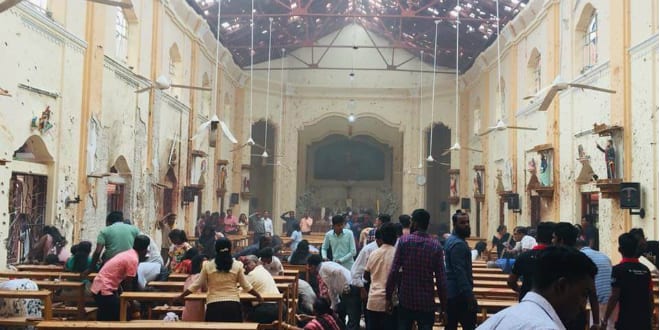Although the Islamic terrorist bombings that rocked Sri Lanka last Easter Sunday—killing more than 300, most inside churches—have shocked many, spectacular terrorist attacks on Easter are much more common than supposed.
Jihadi logic is simple: not only do attacks on Christians during their greatest religious holidays make a symbolic point; but because churches are often packed then—especially Easter, or Resurrection Sunday—they also potentially offer the greatest harvest in casualties.
Thus, on April 9, 2017—Palm Sunday, which starts the holy week of Easter—two Christian churches were bombed during mass in Egypt; at least 50 worshippers were killed and 130 injured and/or mutilated (graphic images/video of aftermath here). Two days later, another terror attack targeting a Coptic Christian monastery was thwarted. On April 12, 2015, Easter Sunday, two explosions targeting two separate churches took place in Egypt. Although no casualties were reported—hence only Coptic Solidarity reported it from Arabic media—large numbers could have resulted.
On Easter Sunday, 2016, an Islamic suicide bombing took place near the children rides of a public park in Pakistan, where Christians were known to be congregated and celebrating after church. At least 74 people—mostly women and children—were killed and nearly 400 injured. Something similar was in store for Pakistan in 2017, as authorities foiled a “major terrorist attack” targeting Christians on Easter.
Right before Good Friday, 2015, jihadis raided a Kenyan university and massacred 147 people; they tried to distinguish between Muslim and Christian students in order to kill only the latter, whom they taunted by saying things like “This will be a good Easter holiday for us.”
Celebrating Easter seems to be an especially dangerous affair in Nigeria: a church was burned down on Easter Sunday, 2014, leaving 150 dead; another church was bombed on Easter Sunday, 2012, leaving some 50 worshippers dead; Muslim herdsmen launched a series of raids during Easter week, 2013, killing at least 80 Christians—mostly children and the elderly; over 200 Christian homes were destroyed, eight churches burned, and 4,500 Christians were also displaced.
As for this Easter, 2019, Muslim raiders killed 11 Christians returning from Good Friday church service in Nigeria; they also kidnapped and slaughtered a female British aid worker. On Sunday, April 21, ten boys were killed while taking part in an Easter procession. Emmanuel Ogebe, a Nigerian human rights lawyer remarked in an email, “The Holy Week killings in Nigeria do not grab headlines like Sri Lanka but still Nigeria’s Christians are dying the deaths of a 1000 cuts in as many installments!”
As Islam’s presence continues to grow in Europe, and in accordance with Islam’s Rule of Numbers, Easter-related attacks are also on the rise.
This Easter in Germany, a migrant man, apparently of Somali origin, entered a church in Munich during Easter Mass and threw dangerous objects at worshippers (variously described as stones or firecrackers) while shouting Islam’s war-cry, “Allahu akbar” (Allah is greater). Congregants hurled their Easter meal baskets on the ground and rushed out in a panic. Some were injured; children were left in a “state of chock.” Predictably, authorities concluded that he was “mentally ill” and therefore not responsible for his actions.
Other Easter related attacks in Europe have been much more deadly. According to one report, “the terror cell that struck in Brussels [in March, 2016, killing 34] was planning to massacre worshippers at Easter church services across Europe, including Britain.” In Scotland, 2016, a Muslim man savaged another Muslim man to death for wishing Christians a Good Friday and Happy Easter. If an Islamic terror plot targeting Easter shoppers in the UK was not thwarted “it would almost certainly have been Britain’s worst terrorist attack, with the potential to cause more deaths than the suicide attacks of July 7, 2005, when 52 people were murdered.”
Although deadly attacks on Christians have taken place every Easter in recent years, less spectacular attacks and shows of hostility are very common around that Christian holiday. A brief list of examples follows:
- Bangladesh: A Muslim mob attacked a Catholic village as it celebrated Easter, 2015; they stabbed its priest, destroyed Bibles, crosses, religious icons, musical instruments and homes, and randomly slaughtered goats and chickens.
- Turkey: Muslims beat a pastor immediately following his Easter service and threatened him with death unless he converted to Islam.
- Iran: 12 Christians stood trial as “apostates” on Easter Sunday, 2012; in 2015, various churches were banned from celebrating Easter Sunday altogether.
- Iraq: According to an AP report from 2013, “Iraq’s Catholic Christians flocked to churches to celebrate Easter Sunday, praying, singing and rejoicing in the resurrection of Christ,” but only “behind high blast walls and tight security cordons” due to precedents.
- Philippines: A cathedral had to cancel 2018 Easter services after Islamic terrorists completely ransacked it.
It should be noted that other Christian holidays, especially Christmas, are also prime times for Islamic terror, and for the same reasons—to make a “point” and because churches are especially packed then. Thus in Egypt, a Cairo church was bombed leaving 27 dead around Christmas 2016. On New Year’s Day, 2011—which Orthodox Christians usher in at church—another Egyptian church was bombed, leaving 23 dead. (For dozens more anecdotes of Muslim violence against and slaughter of Christians around Christmas, see here for Christmas 2018, here for Christmas 2017, here for Christmas 2016, here for Christmas 2015, and here for Christmas 2014.)
Commenting on the most recent carnage of Christians—last Easter Sunday’s bombing campaign in Sri Lanka that left over 300 dead—that nation’s archbishop said “we never expected such a thing to happen and especially on Easter Sunday.”
In reality, bombed churches and massacred worshippers during Christian holy days has become the new norm—with little room for shock, genuine or otherwise.
Reprinted with author’s permission from Raymond Ibrahim





